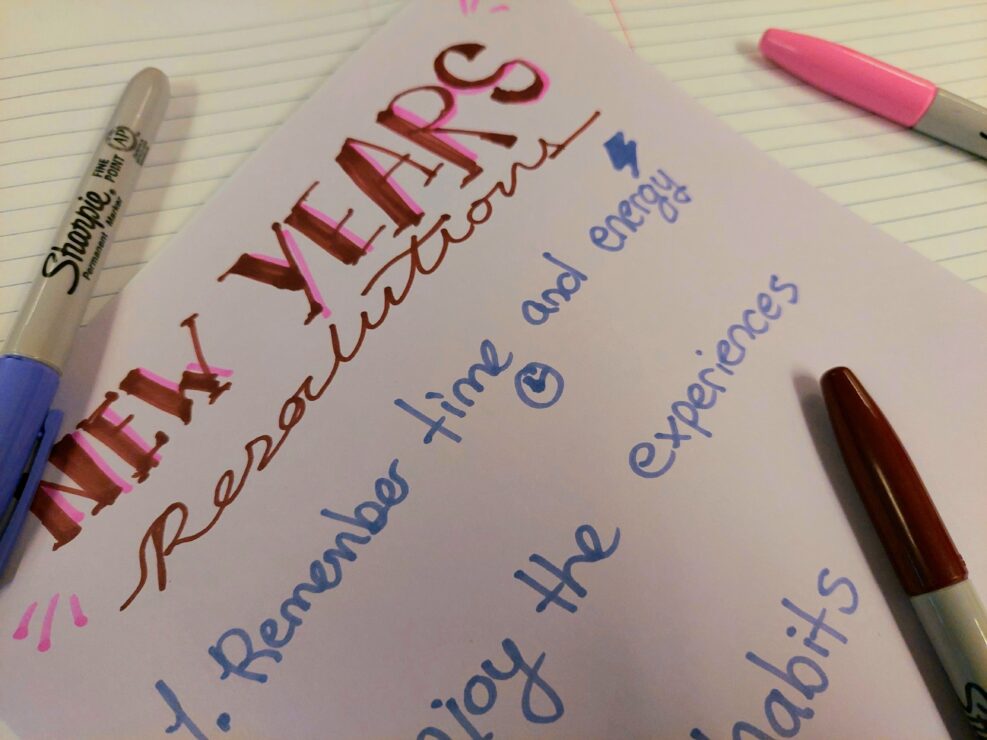A UVic professor’s advice on sticking with your 2022 goals

New Year’s resolutions are notoriously hard to keep. So much so that one of the early references to them, from an 1883 opinion piece in the Worcester Journal, wrote “they pass away almost with the mists of the morning on which they were formed.” Surely those words have already rang true for many of us. For those still hanging on to their resolutions, or those planning on starting in February, here are some tips to help break that 139 year old cycle of failure.
Dr. Ryan Rhodes, who is a professor that researches the gap between intention and behaviour in physical activity at the University of Victoria, sees two main obstacles for everyone trying to enact a resolution. Both strategic challenges and human nature stand in the way of achieving our goals. Often, when we set a resolution, we forget to consider exactly how we are going to follow through with it.
“Someone will say, ‘I want to lose weight’ or ‘I want to be healthy,’ but ultimately there’s a series of steps in between, and the devil is in the details,” said Rhodes in an interview with the Martlet.
Overcoming the strategic challenges is something to think about when you are making a resolution. Rhodes says that the more simple and specific the resolution, the more likely it is you will achieve it.
Rather than simply eating better or reading more, a resolution to cook for yourself four nights a week or read half an hour every day is much more achievable. For larger goals, breaking them down into small steps can be helpful. Take it one week at a time and work on achieving little things instead of staring down a nebulous goal like ‘getting fit.’
Our resolutions sometimes fall short because we forget to think about the time and energy required.
“We love to add things to our lives, but we often don’t ask what we are going to take away in order to achieve this goal,” said Rhodes. He recommends sitting down and scheduling time into your day for your resolution. While at it, make a detailed plan of exactly how, when, and where you will work on your resolution, complete with contingency plans. Not only does this give you an accurate idea of how much time you will need, but it creates a system that holds you accountable to act on your resolution.
When the time comes to get away from the drawing board and get to enacting the resolution, we come up against human nature. Rhodes says that all humans are driven to do pleasurable activities and avoid the unpleasurable ones. As such, it can be really hard to get ourselves off the couch and out to the gym.
Setting up your environment for success is important here. You need to make it easy to act on your resolution. Whether that means putting a book to read on your nightstand or keeping your freezer stocked with frozen spinach instead of frozen pizza, removing any small barriers between you and what you want to do helps remove excuses not to do it.
Working on your resolution should be done when you have the energy to do it. Rhodes said that even though working out at 5:00 AM sounds like a great thing the night before, unless you are a morning person, you’re probably not going to follow through with it. Know yourself and pay attention to when you have the energy to devote to your resolution.
Perhaps the simplest way to get yourself to do something unpleasant is to make it pleasant. Rhodes said to introduce activities you enjoy to your process. Watch Netflix while you cook or go to the gym with friends. When you are starting out, it is more important to enjoy the experience and build the habit than it is to make huge strides towards your goal.
Once you’ve got that going, it is a good idea to keep track of your progress. Monitoring your goals “helps to keep us on track in case we try to blow off our goals and forget,” according to Rhodes.
With a phone always within reach, it is easier than ever to monitor ourselves using an app or fitness tracker. Otherwise, there’s always the good old pen and paper. Analogue systems like planners or habit trackers work great.
Rhodes said that it usually takes around six weeks to form a habit, according to research. If you can keep with it for that long, odds are you won’t have to make the same resolution next year. Until the resolution becomes a habit, however, it is important to stay motivated towards your goal. The best way to do this is to look for the small, everyday improvements that you notice from your new changes. Whether you feel less stress after meditating in the morning or you just feel better after working out, it is important to notice these small, tangible developments.
Remember that most New Year’s resolutions are lifestyle changes. The goal is to build a habit over time, not to just stick to a schedule. If you miss a day or two, or even a whole week of doing your resolution, don’t stress and don’t give up. You’re in it for the long haul — there is still the whole rest of the year to improve.






